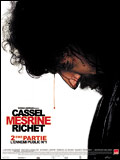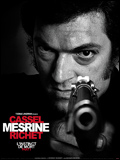
|
|
And to an extent that will most likely infuriate both camps, director Jean-Francois Richet (Assault on Precinct 13 — the remake) successfully shows us both sides of this controversial figure, which is also why such a subject needed two films. In Mesrine: Part 1 - Death Instinct, Mr. Richet focuses on the rise of Mesrine. The film opens with the trap that leads to his bloody end and then rewinds to the birth of Mesrine, as a figure rather than as a man. The first time we encounter young Mesrine, he is in the French military during the Algerian war, doing the dirty job which consists of executing tortured prisoners. If you saw The Battle of Algiers, you already know that this war was a painful and shameful moment in French history and this scene clearly shows that the terrible acts he committed to serve his country are the very ones that broke him as a human being; the fact that he returns to France as a hero, makes him an even more a polarizing figure, given what then follows. And this is what made him such a disturbing figure during his career as a gangster: most of his acts are reprehensible but at the same time reveal issues that society would have preferred to not see, including an abusive prison system. From there, we follow his path, from struggling to make ends meet legally to following a more profitable road of crime, when he thinks that society abandoned him. What's particularly interesting about this first entry is that Mr. Richet's never tries to find excuses for his character. Mesrine is portrayed as a brutal, cruel but charming man who led an adventurous life, in the same tradition as Mr. Pacino's most emblematic characters, Michael Corleone and Tony Montana. This comparison is even more relevant as this film is the more American of the two. Death Instinct is a nervous gangster film, advancing at an exhilarating pace and featuring a great cast, from Gérard Depardieu (Jean de Florette) to Cécile De France (Orchestra Seats) — the film is located somewhere between French and American cinema, enveloping an auteur approach in a classic gangster movie. This is actually one of the most satisfying films I've seen in the last year as it manages to keep its mainstream appeal, remaining uncompromising from the beginning to the end, without ever falling into the traps of commercial movies. Once you finish Mesrine: Part 1, the image you have of him is that of a ruthless but charismatic gangster and you'll certainly wonder why this man had such influence on French society for a brief moment. To get the full picture, you obviously need to watch the follow-up. What you should know, before watching this film unprepared, is that what you see might not be the truth, which is only subtly hinted at in the second part. Death Instinct is indeed based on Mesrine's own biography, in which he included more crimes to make it a more appealing book for the public. Mesrine himself blurred the lines between reality and fiction, most likely making himself a worse figure than he really was for entertainment purposes. Once this is understood, you are ready to better understand the sharply contrasted second film.  Mesrine: Part 2 - Public Enemy #1 is a more a discreet and psychological work than its predecessor. The film doesn't exactly start where the former ends — it skips a few years to introduce us to a more restrained Mesrine. He's also a public figure who's been embraced by the media, music and political words — there were songs, music and books about him, which turned him into some kind of anarchist Robin Hood (which he obviously wasn't). Mesrine: Part 2 - Public Enemy #1 is a more a discreet and psychological work than its predecessor. The film doesn't exactly start where the former ends — it skips a few years to introduce us to a more restrained Mesrine. He's also a public figure who's been embraced by the media, music and political words — there were songs, music and books about him, which turned him into some kind of anarchist Robin Hood (which he obviously wasn't).
Instead, he seemed to be a less cruel and more reflective being, less violent than what we were shown in the first act. We discover a less explosive gangster, a man who likes to point out injustices in society and has his own code of honor, which made him so appealing to the public and dangerous to the authorities. What's interesting in Public Enemy #1 is that Mr. Richet and his screenwriter are using their character as a catalyst to give us a critical portrait of a French society fueled by racism and greed and ruled by an authoritative government. We are not far from the cinema of Costa-Gavras (Missing), with the powers that be wishing to execute Mesrine to silence him rather than punishing him for his crimes. Public Enemy #1 is more subdued and slower paced than Death Instinct, abandoning the Hollywood paradigm of the first act to fully becoming a French film. However, by being less "entertaining" this is also the part that is more flawed, mostly because its seriousness is affected by some poor casting decisions, i.e. actor Gérard Lanvin and his ridiculous take — and accent — on a gangster from Marseille and Samuel Lebihan who isn't very convincing here either. Fortunately Ludivigne Sagnier (Swimming Pool) and Mathieu Almaric (The Diving Bell and the Butterfly) are here to support Mr. Cassel's role, which is the cement holding these two films together. His performance is rough, voluble, and selfless; the actor fully gives himself to every incarnation of the gangster, whether he's vicious, victimized, arrogant, megalomaniacal, overweight or fit. Once you've seen both Public Enemy #1 and Death Instinct and put them into perspective, an opinion about Mesrine can be formed. Whatever side you take, Mr. Richet manages to deliver the fascinating portrait of a charismatic figure and of a society struggling with the scars of a haunted past.
|
|

